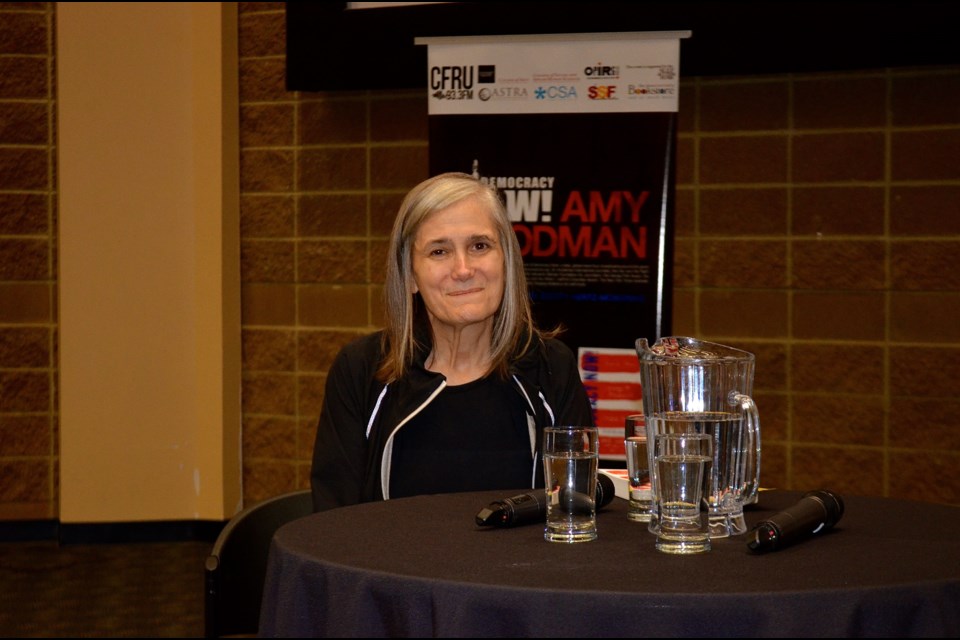Journalist and author Amy Goodman says a free and independent press is essential to protecting democracy and all the freedoms democracy in turn protects.
“I see the media as a huge kitchen table that stretches across the globe that we all sit around and debate the most important issues of the day,” said Goodman.
The award-winning journalist, radio host and executive producer of Democracy Now: The War and Peace Report, gave a speech at the University of Guelph Sunday before sitting down for a conversation with the Scotty Hertz-McWhittie, host of Open Sources on CFRU.
“They say you should never meet your heroes but of course she was very inspirational,” said Hertz-McWhittie after the event.
Goodman shared several stories about her long career from her start with Pacifica Radio in New York to the founding of Democracy Now in 1996 and the publication of her latest book Democracy Now: Twenty Years Covering the Movements Changing America.
“We’re not here to win a popularity contest,” said Goodman. “We need a media that holds those in power accountable. We have a very serious responsibility as journalists to bust open the discussion and debate.”
Her commitment has often put her in harms way and she talked about her experiences covering the Standing Rock protest last year in North Dakota. Video footage captured by Goodman and Democracy Now reporters of protesters being assaulted by pipeline security forces using attack dogs went viral.
“We posted the video online as soon as we could on our Facebook page,” said Goodman. “Within 48 hours, there were 14 million views. That would make any corporate network executive drool.”
Goodman was at the Toronto International Film Festival when she learned she was facing charges for her involvement in the standoff.
“I was invited to speak at the University of Toronto,” said Goodman. “I was in the middle of my talk and I get a text that says you are under arrest. I saw it as a message to journalists, ‘Do not come to North Dakota.’ Which is why we all had to go to North Dakota. I felt we had to call the bluff of authorities especially for young journalists.”
The charges were eventually dropped but not before the story drew media attention from around the world.
“This is what happens when the media shines the spotlight in the right direction,” she said. “This is the kind of reality TV we need.”
Goodman is highly critical of the mainstream media’s reporting or lack thereof on issues such as income inequality, war and climate change.
“It is our responsibility to go where the silence is,” she said.
She said attacks on the press by US President Donald Trump have changed the tone for many network reporters.
“The corporate media is increasingly sounding like Democracy Now,” she said. “They are saying an independent media is essential to the functioning of a democratic society. They are daring to use the word “lie” and “liar”. They are lashing out at him and we are seeing better and better journalism as a result.”
She said there is a growing social justice movement in the US and around the world and a hunger for the type of independent journalism delivered by Democracy Now that launched 21 years ago on nine community radio stations.
“We are now on more than 1,400 public broadcasting stations around the world with a station a week picking us up,” she said. “There is a hunger for independent voices. I think the media can be the greatest force for peace on earth. Instead all too often it is wielded as a weapon of war.”
She said the future of independent journalism depends on a free Internet.
“We can’t let telecommunication companies write legislation that would privatize the Internet,” said Goodman. “This is the way we all speak to each other and we have to make sure that communication remains open.”
